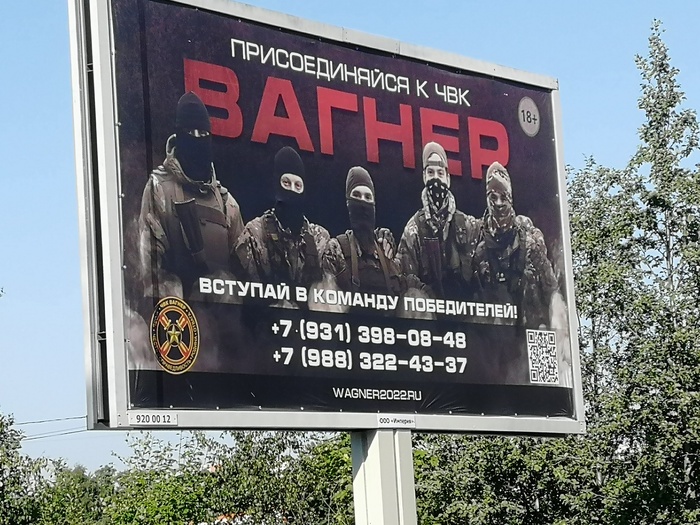by Ambra Visentin
On 29 October, Chechen leader Ramzan Kadyrov announced on his Telegram channel that 170 former fighters from the private Wagner battalion had joined the special forces of Akhmat, the Russian Guard unit stationed in Chechnya. This would be, according to the post, “a mass exchange of personnel”, which the Chechen leader is sure will be followed by many more: “I am certain that other former PMC representatives will follow this example and join the ranks of the Akhmat special forces. As for us, we are only happy to do so. We will be a friendly and united family fighting the enemies of Russia on the territory of the NWO and protecting our motherland with all our efforts”. However, in the Z-channels close to Wagner, the leadership’s statements on the maxi transfer were met with scepticism.
Kadyrov’s words echoed reports from the deputy commander of the Second Army Corps of the Russian armed forces, Apty Alaudinov, who reportedly met with former Wagner soldiers interested in joining Akhmat. Alaudinov repeated the announcement to several media outlets, including the Kyiv Independent, Ria Novosti and the ChGtrk Grozny channel, emphasising that their Chechen fighters “were never in the second row, but marched together with the Wagner assault teams in the front row”.
The “Tik-Tok troops”
The Chechen fighters do not seem to inspire much admiration among Wagner’s soldiers, who have repeatedly referred to them as the “Tik-Tok troops” because of their penchant for filming staged videos far from the front line during the year and a half of war, and their tendency to devote themselves “more to public relations than to real action”. The Akhmat Division, named after the first president of the Chechen Republic, Akhmat Kadyrov, is famous for its very lenient recruitment rules: any Russian citizen can join the battalion, and a criminal record does not seem to be an obstacle. In Ukraine, some of its fighters have been charged with war crimes, such as Ochur-Suge Mongush, who is accused of torturing, castrating and killing a Ukrainian soldier in front of the cameras.
The authors of Grey Zone, a channel previously close to Wagner, also denied the mass transfer of former mercenaries to Akhmat. And the Alex Parker Returns channel quoted a statement allegedly made by the late Yevgeny Prigozhin’s son Pavel: “As for the various rumours about the alleged transfer of PMC Wagner fighters to the Akhmat unit, it is an absolute fabrication”.
The end of the battalion: Kadyrov Vs Prigozhin
Although Kadyrov had initially described Prigozhin as a “dear brother” at the start of the Ukrainian invasion, the fact that there was in fact bad blood between the two soon became a matter of public record.
In late May 2023, Kadyrov reported that his battalions had been deployed in the self-proclaimed DNR, allegedly to attack some settlements. Prigozhin claimed to be unaware of these plans and was therefore invited to a meeting by State Duma deputy Adam Delimkhanov and Chechen parliament speaker Magomed Daudov, attended by PMC commander Dmitry Utkin, who knew the deputies from the first and second Chechen campaigns. On the day of Prigozhin’s mutiny, Chechen leader Ramzan Kadyrov accused Yevgeny Prigozhin of treason, and while some Wagner mercenaries controlled Rostov-on-Don and others marched towards Moscow, columns of Chechens moved towards Rostov.
The fate of the fighters
After the death of battalion commander Yevgeny Prigozhin, whose plane carrying Wagner’s top lieutenants was shot down a few kilometres from St Petersburg on 23 August, the fate of his soldiers remained a question mark for a long time. According to BBC Russia’s sources, the PMC fighters are being absorbed into various projects. A small number are actually choosing to join the Chechen Akhmat battalion. Some Wagner fighters are preparing to join the PMC Redut, initially linked to businessman Gennady Timchenko, where they will continue to fight exclusively in Ukraine. Other fighters will sign contracts with the Russian Ministry of Defence, where the “War for the Liberation of Ukraine” is a project headed by Deputy Minister Yunus-Bek Yevkurov. The fighters serving in the military projects in Syria and Libya taken over by the ministry will keep their posts. Finally, for those more nostalgic for the Prigozhin family, there is the possibility of signing contracts with the Russian Guard and continuing to work for their son Pavel Prigozhin, who will maintain the commercial contracts inherited from his father and smaller military projects in African countries, including Mali, Sudan and the Central African Republic.
Wagner’s plan to provide an air-defense system to Hezbollah
US intelligence has received information that Wagner PMC is planning to transfer the Pantsir S-1 anti-aircraft missile system (Sa-22 according to NATO classification) to the Lebanese group Hezbollah. This is what the Wall Street Journal writes, citing sources close to the intelligence. One of the WSJ’s sources clarified that Washington had not confirmed the delivery of the Pantsir. However, the US is monitoring discussions on the issue. The possible transfer of an anti-aircraft system to Hezbollah in the context of the Israeli-Palestinian conflict raises “serious concerns” for US authorities. The WSJ does not specify who is negotiating on behalf of the Wagner PMC. The paper also notes that the US had previously stationed an aircraft carrier in the eastern Mediterranean to try to contain Hezbollah in case it attacked Israel.
Cover image: tastyFreder1k on Pikabu
























